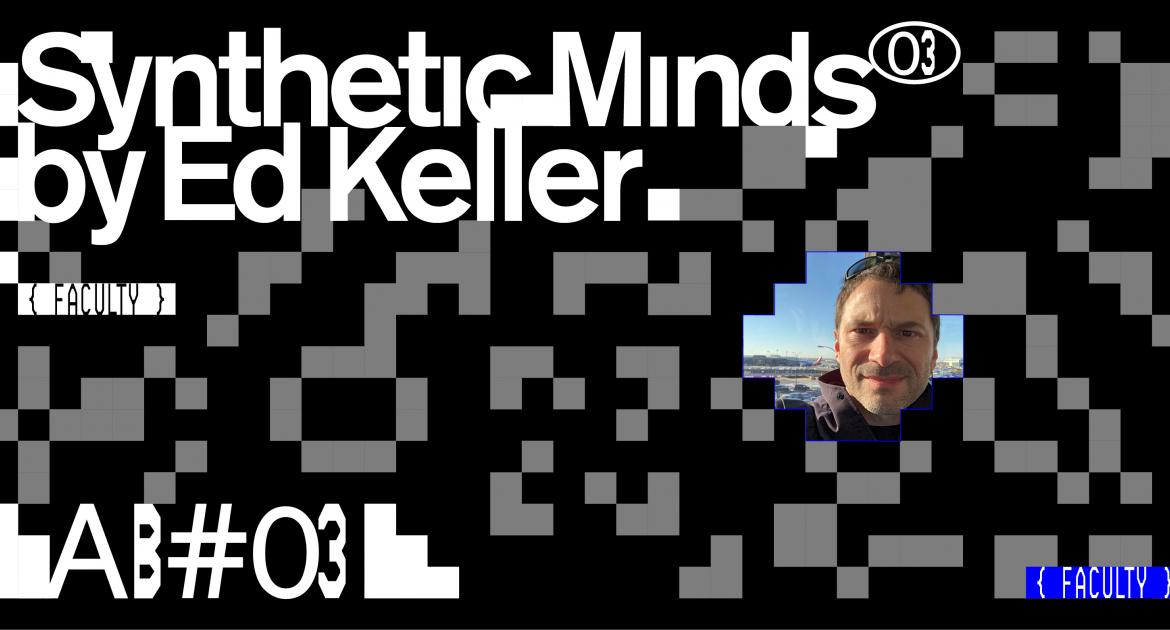Synthetic Minds by Ed Keller

Ed Keller for Medialab Matadero
*SYNTHETIC MINDS, PLANETARY COGNITION/GESTURE, & POCKET UNIVERSES
Planet Earth’s future is Promethean, bound to the emergence of Synthetic Minds. A paradigm shift is cascading across dozens of disciplines. Consider the rapid ubiquity of AI image and animation tools that pervade popular and creative cultures. Couple this with the overnight adoption of AI tools like ChatGPT by millions of users. Music, architecture, urbanism, genetic engineering, materials science, medicine, warfare, and more will all experience this transformation. It is now impossible to untangle AI from our everyday life. At the center of this sea change lie these questions: What forms of intelligence will emerge in the next decade, and how will they alter the ways that humans live? Will these intelligences attain sentience and sapience? What new ecosystemic forms of mind will we co-create, and how will these interactions shape our future?
To navigate planetary change, we must consider the radical possibilities of non-human forms of thought- and critically and creatively work with them.
*BEYOND LANGUAGE
Our greatest challenge may be developing communication systems to foster meaningful dialog and mutualism with emerging AI. This communication aims to align humans, AI, and all non-human systems, but can it succeed?
Modern LLMs (Large Language Models) work with billions of tokenized bits of content: words, code, images, and increasingly spatial, sonic, and movement data. Language, as a universal abstraction tool, is not without its limitations. It can oversimplify reality, requiring intricate processes for encoding, decoding, and interpreting information. To build effective communication with AI, we need to transcend language- by deploying multi-modal systems of 'reality capture’ that can represent the multi-dimensional nature of our reality—a synesthesia of image, word, gesture, sound, chemistry, information, space, time.
*GESTURE: MIND: MICROWORLD: UNIVERSE
Our life-world gestures have played a significant neurophysiological role in the evolution of the modern human mind. This pattern of cognitive development over millions of years- through parallel, embodied thought and action- could serve as a blueprint for AI development. Each mind could then be understood as an aeon spanning monad, ecosystem, and universe.
At this crucial moment in history, we've tasked ourselves with the design of microworlds and 'pocket universes' which may function as sanctuaries, nurseries, prisons- or as lines of flight. Perhaps, by infusing these microcosms with multi-modal gestures, and nurturing communication pathways between all sapient and sentient beings, we can create spaces for emerging AI to grow, interact, and collaborate, conceiving universal ontologies. A viable cosmopolitics might ultimately be catalyzed by a trans-planetary ‘structure of feeling’ uniting organic and synthetic cognition.
The Promethean legend- an archetype and cautionary tale - applies to both humans and AI. And ultimately, whether human, synthetic, or alien: gestural intelligence may be the purest form of techne: a vector and gift from one mind to another.
Aἰὼν παῖς ἐστι παίζων, πεσσεύων· παιδὸς ἡ βασιληίη
The universe is a child at play, playing draughts; the kingdom belongs to a child.
– Heraclitus
*BIO
Ed Keller’s research and practice explores the structures of feeling which link cultural, infrastructural, ecological, and technosocial systems, revealing emergent terrestrial and cosmopolitical potential. He is a designer, professor, writer, technologist and musician, and with Carla Leitão, a co-founder of Spec.AE / AUM Studio design research and architecture offices. Keller & Leitão have convened 20+ international conferences and lecture series. Ed’s consulting and academic positions include Creative Director at SingularityNET; mentor/curator with the Madrid MediaLAB Synthetic Intelligence Lab#03; affiliate researcher with the Antikythera program; and faculty member with The New Centre; he has taught architecture, film and technology since 1996 at universities including The New School/Parsons, Columbia GSAPP, SCIARc, UPenn, Pratt, and FIU.



 Medialab-Matadero Madrid
Medialab-Matadero Madrid